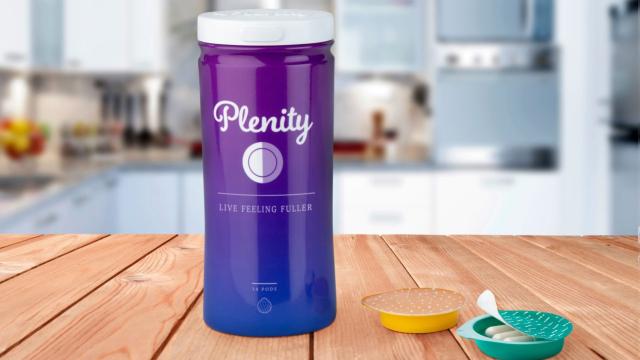Overweight and obese people will soon have a new medical option to help them manage their weight. On Monday, the Boston biotech company Gelesis announced they had received clearance from the Food and Drug Administration to market their novel weight loss aid to the public, a pill-based medical device called Plenity that makes people feel full faster.
Plenity is unique in several ways, according to Harry Leider, chief medical officer of Gelesis. The treatment is intended (alongside diet and exercise) for people with a body mass index as high as 40. But it’s the first FDA-approved or cleared weight loss treatment for people with a body mass index as low as 25, which is the threshold for someone being considered overweight. Historically, such treatments are only used by people considered obese, with a BMI over 30. And how it works is also different than previous weight loss aids.
“What makes Plenity different and unique, primarily, is in its mechanism of action, which uses a superabsorbent hydrogel,” Leider told Gizmodo.
The hydrogel material is a proprietary blend of cellulose (the building block of plants, which is commonly eaten as fibre) and citric acid that’s formed into a 3-dimensional matrix. This material, when introduced to water, can absorb up to 100 times its weight. When someone ingests Plenity with their meal, the theory goes, it’ll expand in the stomach and small intestine, leaving less room available for food and essentially convincing your body to feel full sooner than it would otherwise.
“It’s not absorbed by the body either, so it works entirely by its mechanical action and leaves the body safely,” Leider added.
The FDA did not immediately respond to Gizmodo’s request for comment.
The major piece of evidence that secured the FDA’s clearance of Plenity was a randomised, double-blinded, placebo-controlled trial involving more than 400 patients with a BMI between 27 to 40. According to the trial, published online last December, patients who took Plenity for six months in conjunction with a diet and exercise regimen lost on average 6.4 per cent of their baseline weight, compared to the 4.4 per cent average lost by those on placebo.
That’s a statistically significant, if modest, difference, but Gelesis points to the success achieved by so-called responders in the trial as a better marker of Plenity’s potential. According to the study, about 60 per cent of people who took Plenity lost at least 5 per cent of their body weight (an average of 10kg, or 10cm less in waist size), while 27 per cent lost 10 per cent or more body weight.
By contrast, the odds of achieving either goal in the placebo group was roughly half that, at 42 per cent and 15 per cent, respectively. These success stories were usually apparent very quickly, with more than 85 per cent who lost 5 per cent or more body weight by the six-month mark having lost 3 per cent or more body weight by the eight-week mark.
“Obesity probably isn’t just one disease, but many. So almost no treatment will work for everyone,” Leider said. “But these responders can be noticed very early on.”
Classified as a Class 2 medical device, Plenity will nonetheless feel much like a typical drug for people who take it. Users will be told to swallow three capsules with a glass of water 20 to 30 minutes before lunch and dinner. Plenity will also only be available via prescription, though Gelesis COO David Pass told Gizmodo that it plans to create a telemedicine program where potential patients can be screened and prescribed Plenity remotely, in addition to prescriptions being available from their doctor’s office. The company might someday explore an over-the-counter option, but not for the immediate future.
Plenity’s safety also appears to be impressive, since there was no significant difference in the amount and severity of reported individual side effects compared to placebo. (In both groups, roughly 3 per cent reported serious adverse effects, though most happened in the beginning and lasted less than two weeks.) However, mild gastrointestinal symptoms, such as stomach pain or constipation, were more common overall for people who took Plenity.
“We haven’t tested any larger qualities [of Plenity], but from a scientific standpoint, it should be relatively safe even if you take more,” Leider responded when Gizmodo asked about the risks of someone accidentally taking more than three capsules. “There’s only so much fluid that can be absorbed at once.”
That said, the treatment will not be recommended for pregnant women, people with serious digestive issues, such as Crohn’s disease, and those with an allergy to Plenity’s ingredients, primarily citric acid and cellulose.
It’ll take some time before Plenity is widely available to the public, though. The company expects to test-run a limited launch of the product by the end of 2019, with plans to have it available everywhere in the country sometime next year. Gelesis’ Pass told Gizmodo there is no concrete list price out for Plenity just yet, but added that the company is “committed to making Plenity affordable for the majority of our targeted customers, with or without insurance.”
Gelesis is also pursuing clinical trial efforts to use the same hydrogel technology, slightly modified, to help treat other conditions like diabetes, non-alcoholic fatty liver disease, and inflammatory bowel disease.
